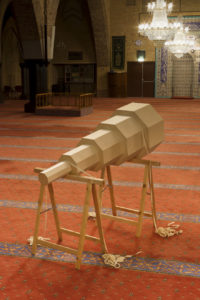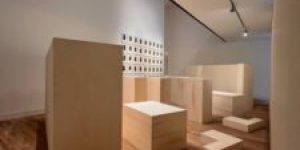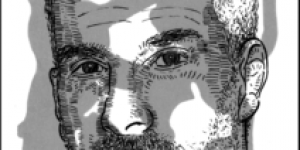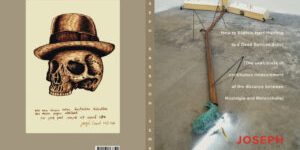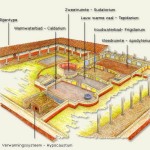Kunstmuseum Den Haag – Joseph Sassoon Semah – 31 oktober 2020 t/m 21 maart 2021
No Comments yetJoseph Sassoon Semah – On Friendship… 31 October 2020 – 19 September 2021
Exile, hospitality and friendship are key themes in the work of Joseph Sassoon Semah (b. 1948, Baghdad). In 1950 he and his parents were forced to leave Iraq to Israel, and Joseph eventually arrived in Amsterdam in 1981, via London, Berlin and Paris. On Friendship… will for the first time bring together 36 architectural models of houses, a synagogue, schools and cultural buildings made by Sassoon Semah that refer to the liberal Jewish culture of his Babylonian ancestors – a culture which, he says, barely exists except in memory now.
86 drawings and wall-mounted objects refer to the old culture and to exile. These works are part of his research project On Friendship / (Collateral Damage) III – The Third GaLUT: Baghdad, Jerusalem, Amsterdam. Referring to his own GaLUT (Hebrew for exile), these are the three cities with a reputation for tolerance where Sassoon Semah was made to feel welcome. Now he himself will act as host and friend, sharing his original culture. By way of a personal welcome, the triptych Joseph / YOSeF / Yusuf will be displayed beside one of the entrances to the exhibition in Kunstmuseum Den Haag’s Projects Gallery. The triptych is a kind of self-portrait featuring the artist’s name in Dutch, Hebrew and Arabic, along with a godwit (the national bird of the Netherlands), a hoopoe (the national bird of Israel) and a chukar partridge (the national bird of Iraq).
The work of Sassoon Semah allows plenty of scope for critical reflection on identity, history and tradition, and is part of the artist’s long exploration of the relationship between Judaism and Christianity as sources of western art and culture, and of politics. The aspirations of his grandfather, the Chief Rabbi of Baghdad, to promote dialogue between different religions and world views, resonates in everything he makes. One of the display cases will for example contain the prayer shawl (Tallit) that belonged to his grandfather, who refused to leave Baghdad during the first forced deportation, probably because to him Baghdad was already a place of exile, but above all because Iraq was his homeland. One of the wooden architectural models, a bronze version of which with rams’ horns will also be shown, is based on his synagogue, the Meir Taweig synagogue in Baghdad, which still exists but is no longer in use.
Lost paradise
Drawings of human skulls and the skulls of animals native to Iraq – 86 of them, the age at which Sassoon Semah’s grandfather died—also symbolise the lost paradise: the straight lines symbolising the street plan of the destroyed Jewish quarter, the yarn referring to measuring and territory, the sewing itself to textile as a carrier of information. A typewriter with Hebrew script and sand from Jerusalem on a steel Tefillin refer to the second place of exile, that of Sassoon Semah’s father, a leading lawyer in Israel. Joseph has reworked the book in the display case, the Talmud Bavli Tractate Pesachiem YaKNeHa’Z. His additions to the typography refer to his concept of architecture in exile. The abstract forms reference Mondrian, De Stijl and other abstract art of the West, the third place of exile. And so, in a metaphorical sense, On Friendship… is an ode to a lost culture, and at the same time an invitation to a dialogue about these different cultures.
Publication
New English-language publication ‘Joseph Sassoon Semah: On Friendship / (Collateral Damage) III – The Third GaLUT: Baghdad, Jerusalem, Amsterdam’ – published at the end of October, available in the museum shop. 264 pages, ISBN 978 90 361 0601 65, design and layout by Geert Schriever (artlifelove) Amsterdam, edited by: Linda Bouws and Joseph Sassoon Semah, € 39.95.
Nederlands:
Centrale thema’s in het werk van Joseph Sassoon Semah (1948, Bagdad) zijn ballingschap en gastvrijheid. Zelf wordt hij in 1950 samen met zijn ouders gedwongen te vertrekken uit Irak naar Israël en komt via Londen, Parijs en Berlijn in Amsterdam terecht. In de tentoonstelling brengt hij onder meer 36 architecturale modellen bijeen van huizen, een synagoog, school- en cultuurgebouwen die refereren aan de joods-liberale cultuur van zijn Babylonische voorouders, een cultuur die volgens hem buiten de herinnering amper nog bestaat.
Het werk van Sassoon Semah laat volop ruimte voor kritische reflectie op identiteit, geschiedenis en traditie, en maakt deel uit van een langdurig onderzoek van de kunstenaar naar de relatie tussen het jodendom en het christendom als bronnen van de westerse kunst- en cultuurgeschiedenis. In alles resoneert het streven van zijn grootvader, de opperrabbijn van Bagdad, om de dialoog te bevorderen tussen verschillende religies en wereldbeelden.
Zie: https://www.kunstmuseum.nl/nl/tentoonstellingen/joseph-sassoon-semah
Zie ook: https://vimeo.com/484103296/1f2e571ca3
You May Also Like
Comments
Leave a Reply
